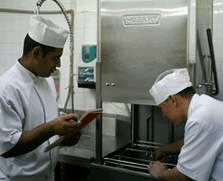|
|
| Quality Of Workplace Training And Assessment |
Irrashaimase!! That’s the cheerful welcome greeting you will hear when you step into any Sushi King restaurant. Sushi King restaurants are the largest sushi chain of restaurants in Malaysia with over 60 restaurants. The key to their success is their unique ‘Kaiten Sushi’ or ‘Revolving Sushi’ coupled with the quick service restaurant concept.
We (CEDR Corporate Consulting) first got to know the people behind the Sushi King restaurants when their Senior Manager of Operations and a couple of their Training Executives attended our CBTE Assessor Certification and CBTE Instructor Certification in 2004. They registered for the sessions because they knew of our expertise in competency based approach to training and assessment.
NO EXPERIENCE IN TRAINING & ASSESSING
Sushi King restaurants have a training and assessment system to ensure the quality and consistency of their service as well as food at every outlet. This training and assessment system is all the more critical when we consider that the staff turnover for the quick service/ fast food restaurants sector is usually high.
In this sector, the service crew and kitchen crew at the outlets are usually in their early to mid twenties. A number of new recruits do not have experience in the Food & Beverage industry and they need immediate and systematic training to enable them to contribute to the restaurant operations. Subsequently, they will be assessed to confirm their competency.
While the training and assessment system was being monitored and supported by their Training Department, they had a situation: Some may have had the experience as they had previously worked in other fast food chains. Otherwise, they would do the best they can. This was not good for Sushi King in terms of maintaining the quality of their service and food. They could not afford to leave the quality of their training and assessment to chance.
TRAINING THE ASSESSORS & TRAINERS
Sushi King restaurants identified their first priority as the training of the assessors. We proposed 2 days of training on theory and 1 day of practical at the outlet for the Conducting Competency Based Assessment programme. We checked with them on operations at the outlets and looked into their Standard Operating Procedures and assessment tools.
After several sessions of training the assessors, it was timely to look into improving the training that was being carried out at the Sushi King outlets by restaurant managers, assistant managers and service leaders. We came up with Conducting Competency Based Workplace Training for them, which was a 2-day programme designed to train them to conduct training at the Sushi King outlets. Again we recommended the last day of the training to be a practical session held at the outlets. During the practical session, each participant had to conduct a short session of training based on Sushi King restaurant Standard Operating Procedures and received feedback on how well he/she conducted the training.
FIVE YEARS ON....
It’s been 5 years since we started working with Sushi King restaurants to enhance the quality of their assessment and training at the outlets. Their business has grown from 20-odd outlets to now over 60 outlets. Every year we continue to train new assessors and workplace trainers for Sushi King restaurants. During our latest session in February 2010, we noticed that the restaurant managers and assistant restaurant managers who attended were familiar with the process of carrying out the assessment compared to the earlier batches of participants. The assessment tools had also been amended and updated.
Over the years, the Senior Manager of Operations who had first attended our CBTE Instructor and Assessor had been promoted to the position of General Manager. One of the District Managers that we have trained to be an assessor is now heading the Operations. A couple of restaurant managers that we have trained to be assessors have moved to the Head Office; one as a trainer in the Training Department and another as an executive under the Operations Department.
From the beginning, Sushi King restaurants had a training and assessment system which identified who needs to conduct training and assessment, when to train and assess, the purpose of assessment and the records that needed to be kept. This was applicable to every outlet.
However, having a system alone was not enough. The people playing a part in the system needed to play their roles:
- Workplace trainers and assessors to train and assess
- Training Department to maintain the quality of assessment tools
- District managers to support their subordinates’ time and effort spent in training and assessing
- Management to strongly support the implementation of the system

Our part in this has been to train everyone in supporting the Sushi King restaurants’ training and assessment system. In selecting the participants to be trained, Sushi King restaurants have ensured that ALL the relevant parties have the knowledge of competency based assessment and have had the experience of conducting an assessment so as to be able to play their role even more effectively.
Although Sushi King restaurants are not required to contribute to the Human Resource Development Fund, they have been willing to allocate the time and the funds to consistently train their people to be effective workplace assessors and trainers (and in other areas as well). Perhaps they have considered that the alternative - which is to leave the quality of their workplace assessment and training to chance, would in the long run turn out to be more costly.
CEDR would to thank Sushi Kin Sdn Bhd for granting us the permission to write about our collaboration with them in this issue of Infolink. Care for some sushi? Check out their menu and promotions at www.sushi-king.com. |
|
|